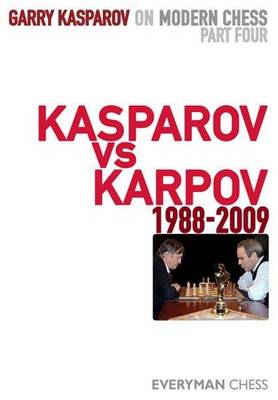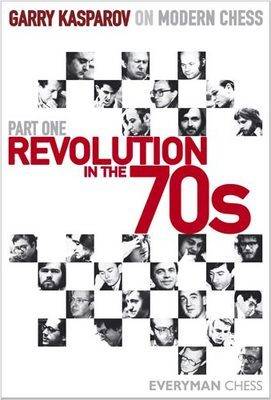Garry Kasparov on Modern Chess
2 total works
Pt. 4
Between 1984 and 1990 Garry Kasparov and Anatoly Karpov contested five long matches for the World Championship. This fourth volume of the series 'Garry Kasparov on Modern Chess' concentrates on all the games played between the two from 1988 to the present day and features their fifth World Championship match played in New York and Lyon 1990. The period after 1990 was also a fascinating one in the chess world as it witnessed the emergence of a new generation of young grandmasters capable of challenging the supremacy of the two 'K's'. Between them these great champions had dominated the chess landscape for the previous two decades and it has seemed unthinkable that a major tournament could be won by a different player. Now, however, grandmasters such as Viswanathan Anand, Vassily Ivanchuk, Nigel Short, Boris Gelfand, Vladimir Kramnik and Veselin Topalov arrived on the scene and proved themselves capable of competing successfully at the very highest levels. This period also witnessed an increasing disatisfaction amongst the world elite with the traditional ruling body, FIDE (the World Chess Federation).
This led to attempts by the leading grandmasters to organise the World Championship cycle outside of FIDE's jurisdiction. In the late 1980s the Grandmasters Assocation (GMA) was created and was responsible for the organisation of the World Cup - a tournament championship of the world's leading chess players. Another organisation, the Professional Chessplayers Association (PCA) followed in 1993. In this volume Garry Kasparov (world champion between 1985 and 2000 and generally regarded as the greatest player ever) analyses in depth all the games and matches he played against his great rival Anatoly Karpov from 1988 to the present day. Kasparov was personally involved in the creation of both the GMA and PCA and gives a fascinating insight into this important time in chess history.
This led to attempts by the leading grandmasters to organise the World Championship cycle outside of FIDE's jurisdiction. In the late 1980s the Grandmasters Assocation (GMA) was created and was responsible for the organisation of the World Cup - a tournament championship of the world's leading chess players. Another organisation, the Professional Chessplayers Association (PCA) followed in 1993. In this volume Garry Kasparov (world champion between 1985 and 2000 and generally regarded as the greatest player ever) analyses in depth all the games and matches he played against his great rival Anatoly Karpov from 1988 to the present day. Kasparov was personally involved in the creation of both the GMA and PCA and gives a fascinating insight into this important time in chess history.
Pt. 1
This book - the first in a brand new series - follows on from "My Great Predecessors" and sees chess legend Garry Kasparov reflecting on a pivotal time in chess history. Bobby Fischer's spurt towards the chess summit (1970-1972) marked the approach of a new era affecting all aspects of the game and opening theory in particular. Fischer demonstrated the need for deep preparation with both colours, expanded the range of openings knowledge, and laid the foundations for present-day professional chess. The leader of the new generation, Anatoly Karpov, fully reaped the benefits of the Fischer revolution by mastering the lessons of his great predecessor. Of the players of the older generation, only Victor Korchnoi was able to achieve such a high level of professionalism. Alas, Fischer then left the chess stage. However, the tectonic shifts he had brought about led to the beginning of a genuine revolution in opening theory - a revolution that overturned traditional impressions about many typical positions. Between 1972 and 1975 alone, progress in the field of opening theory was more significant than in the entire preceding decade!
Under Fischer's influence chess was radically regenerated - a process which then continued to accelerate. As a result, from the 1972 Fischer-Spassky world championship match to 1984 and the Kasparov-Karpov matches, the overall picture of chess openings changed almost beyond recognition. This fascinating book tells the story of this opening revolution. This story is told not only with the insight of Garry Kasparov, but also as seen through the eyes of the leading players who were at the forefront of the development of chess theory during those key years. The reader will witness at first hand how rapidly and inexorably chess development approached the coming computer era.
Under Fischer's influence chess was radically regenerated - a process which then continued to accelerate. As a result, from the 1972 Fischer-Spassky world championship match to 1984 and the Kasparov-Karpov matches, the overall picture of chess openings changed almost beyond recognition. This fascinating book tells the story of this opening revolution. This story is told not only with the insight of Garry Kasparov, but also as seen through the eyes of the leading players who were at the forefront of the development of chess theory during those key years. The reader will witness at first hand how rapidly and inexorably chess development approached the coming computer era.

